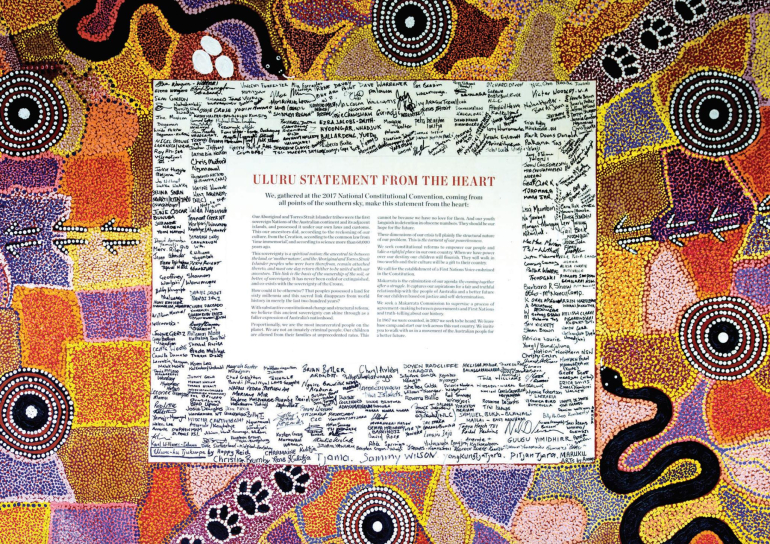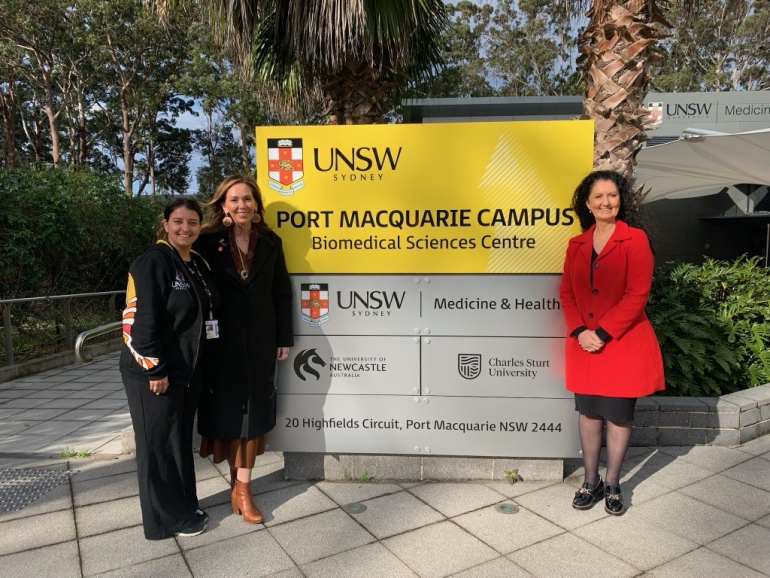In 2023, UNSW responded to the Uluru Statement of the Heart by championing the Voice referendum, and while disappointment with the result was difficult to navigate, the ambition to not lose momentum in walking towards a better future remained.
“We are unwavering in our desire to heed the call of the Uluru Statement of the Heart for Voice, Treaty and Truth,” says Professor Leanne Holt, a Worimi and Biripi woman and inaugural Deputy Vice-Chancellor Indigenous (DVCI) at UNSW.
“And so, earlier this year, UNSW commenced a micro-treaty process to create a space for Dialogues with Indigenous students, staff and our connected Aboriginal communities.”
A micro-treaty empowers Indigenous communities by enabling self-determination, ensuring their involvement in decisions affecting them directly, fostering autonomy, and addressing systemic barriers, promoting cultural inclusivity, and empowering Aboriginal and Torres Strait Islander students, staff and communities.
“We are using the language of treaty because it is a pillar of the Uluru Statement, and the process of community Dialogue and then negotiation and agreement is a healing and empowering process,” says Prof. Holt.
By establishing a micro-treaty, Aboriginal and Torres Strait Islander students, staff,alumni and our Aboriginal communities gain a meaningful voice in shaping thedynamics of their relationship with the University now and into the future.Professor Attila BrungsUNSW Vice-Chancellor and President
Dr Cara Cross, a Goori Dubay/Galbaan (woman) from the Worimi and Biripai nations and Executive Officer of the DVCI Division at UNSW Sydney, started working with Prof. Holt to think about UNSW’s Indigenous Strategy and next steps soon after the Voice referendum.
“We saw the Australian Universities Accord Interim Report which anticipated the Accord placing an emphasis on First Nations Australians being at the ‘heart of the education system’,” says Dr Cross.
“We determined that our Indigenous Strategy should sit at the heart of UNSW’s Strategy. Rather than being something developed for the Indigenous community, we wanted our communities to be given a voice to create the strategy. And the micro-treaty process of Dialogues allows for that, ensuring community are involved in decisions that affect them.”
The Dialogues will follow the methodology used by Scientia Professor Megan Davis, a Cobble Cobble woman from the Barrungam nation and Pro Vice-Chancellor Society at UNSW, in creating the Uluru Statement from the Heart.
The need for a voice for communities didn't dissipate after the referendum. It's as urgenttoday as it was on October 14, and there are many ways to give Aboriginal people a voice– this is one very innovative and nation-leading way.Professor Megan DavisPro Vice-Chancellor Society at UNSW
“This UNSW work on a micro treaty, under the leadership of DVCI Leanne Holt, is pioneering. It enables Aboriginal people connected to the University to have a voice on many matters that concern them. The process of consultation is key to any successful process, and our communities have overwhelmingly endorsed this as a good idea. This approach is completely consistent with UNSW's commitment to the Uluru Statement from the Heart,” Prof. Davis says.
“The need for a voice for communities didn't dissipate after the referendum. It's as urgent today as it was on October 14, and there are many ways to give Aboriginal people a voice – this is one very innovative and nation-leading way.”
UNSW Vice-Chancellor and President Professor Attila Brungs, says, “By UNSW engaging in discussions for a micro-treaty with the University’s Aboriginal communities, we demonstrate our continued commitment to the Uluru Statement from The Heart.
“By establishing a micro-treaty, Aboriginal and Torres Strait Islander students, staff, alumni and our Aboriginal communities gain a meaningful voice in shaping the dynamics of their relationship with the University now and into the future.
“The Australian Universities Accord Final Report called for First Nations people to be at the heart of Australia’s higher education system. The micro-treaty exemplifies this intent, empowering Aboriginal and Torres Strait Islander peoples through self-determination in higher education, leading to real societal change and impact.”
UNSW’s Indigenous communities
The micro-treaty Dialogues will be led by a Representative Council comprising Indigenous undergraduate and postgraduate students, professional staff and academic staff, along with alumni and members of UNSW-connected Aboriginal communities across NSW.
Initial discussions have commenced with communities from Kensington (Bidjigal), Paddington, Sydney (Gadigal), Canberra (Ngunnawal, Ngambri), Albury, Wagga Wagga, Griffith (Wiradjuri), Port Macquarie (Biripai), Coffs Harbour (Gumbaynggirr), Fowler’s Gap (Wilyakali), and Walgett (Gamilaraay, Yuwaalaraay, Ngayiimbaa).
“Having communities come together to look at self-empowerment through education and research will be very powerful,” says Prof. Holt.
“In the process, the community will be sharing their voices, expertise and knowledge, and how they would like to see themselves positioned into the future.
“A micro-treaty means the communities will have an authentic voice in outlining what the commitments will be. And through a process of negotiation they will define their relationship with UNSW.”

